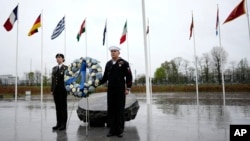The upcoming NATO summit in Washington July 9 to July 11 will celebrate 75 years of the most successful defensive alliance in history. The agenda will focus on current challenges and will set the course to confront challenges of the future.
During a recent interview, Secretary of State Antony Blinken underscored the importance of recalling what lies at the heart of NATO’s foundation.
“And that’s the power of collective defense. The power of Article 5 that says an attack on one is an attack on all is the strongest possible deterrent to aggression, the strongest and most effective way to prevent war in the first place, to avoid conflict in the first place, because any would-be aggressor knows that an attack on any one member means they’re going to have deal with every member of the Alliance,” he said.
The number of countries that are now NATO members is 32 – with Finland and Sweden being the most recent, something, Secretary Blinken said, “that, for most people, would have been unimaginable just a few years ago.”
“We have an Alliance that’s stronger and has greater investment in it than it’s ever had. We now have 23 countries that are meeting the 2 percent of GDP committed to [the] defense mark that was set at the Wales Summit back in 2014,” he said. “There were just nine countries in 2021 that met the mark. We’re now at 23, an 18 percent increase in defense investment by the Allies across the Alliance.”
Another aspect of a strengthening Alliance is the partnership with countries beyond North America and Europe:
“We have four partners from the Indo-Pacific coming to the NATO summit, as they have for the last three years: Australia, New Zealand, Japan, [the Republic of] Korea. This is one manifestation and one recognition of something that really is new, which is that increasingly partners in Europe see challenges halfway around the world in Asia as being relevant to them; just as partners in Asia see challenges around the world in Europe as being relevant to them. [Japanese] Prime Minister Kishida put it best in the wake of Russian aggression against Ukraine. He said what happens in Europe today could happen in Asia tomorrow.”
The NATO Summit in Washington will, as Secretary Blinken said, “make sure that we have the right defenses across the Alliance where they’re needed ... It’s manifestly in the interests of the people that all of us represent.”






